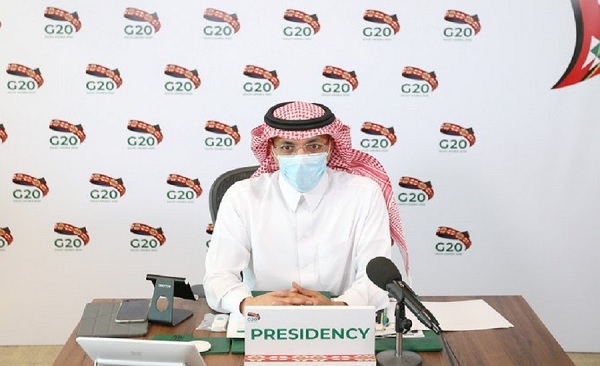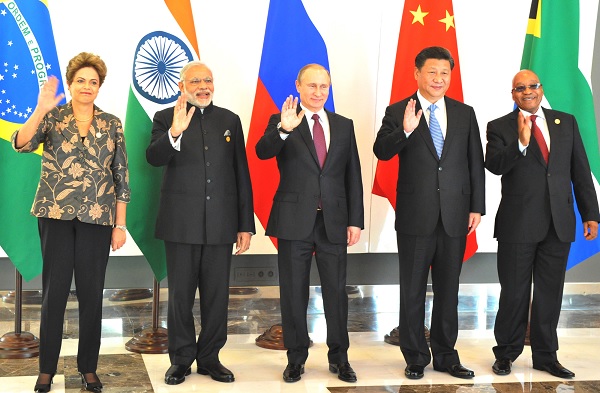
by admin | May 25, 2021 | Muslim World

Saudi Minister of Finance Mohammed Al-Jadaan attends a virtual meeting of G20 finance ministers and central bank governors in Riyadh on July 18, 2020.
Ghazanfar Ali Khan
RIYADH – The G20 under the current presidency of Saudi Arabia will consider extending a debt payments suspension program for the poorest countries as financial policymakers from the world’s biggest economies continue to take “exceptional measures” to support debt-ridden nations and expedite global economic recovery. This was announced here on July 18 following a virtual meeting of the G20 finance ministers and central bank governors.
Saudi Arabia’s finance minister Mohammed Al Jadaan and the Kingdom’s central bank governor Ahmed Al Kholifey chaired the virtual meeting. Saudi Arabia has taken a global leadership role in combating Covid-19 pandemic and it stands firmly in unison with the international community, especially with the G20 member states, to deal with this international crisis, said a report released on this occasion.
Al-Jaadan said: “The world is still living through Covid-19 and there is a lot of uncertainty around, but I am optimistic as always. Saudi has weathered an even worse oil crisis in the past and worse geopolitical situation in the past and …we recovered strongly, as this is not going to be an exception… We are watching what’s happening in the world,” Al Jadaan said, highlighting that the G20 group is prioritizing its efforts to support the global economic recovery.
Referring to the Debt Service Suspension Initiative (DSSI), a joint communique released by the G20 after the meeting, he said: “We will consider a possible extension of the DSSI in the second half of 2020, taking into account the development of the Covid-19 pandemic situation.” The G20 group has made progress on the DSSI, which runs until the end of 2020. A total of 42 countries have requested support so far under the scheme, amounting to the deferral of an estimated $5.3 billion in debt repayments, the group said.
The International Monetary Fund (IMF) and the World Bank Group will send a report to the G20 in October explaining the financial conditions of the countries eligible for debt relief. There is, however, a need for “further progress and [the G20] strongly encourages private creditors to participate in the DSSI on comparable terms when requested by eligible countries”, the communique added. It is important to note here that the G20 member states agreed in April this year to a time-bound suspension of debt service to deal with the Covid-19 pandemic.
The statement further said: “We are determined to continue to use all available policy tools to safeguard people’s lives, jobs and incomes, support global economic recovery, and enhance the resilience of the financial system, while safeguarding against downside risks.” Referring to the concerns raised by the World Bank that China, a member state of G20 and the largest creditor, was not participating fully, the G20 officials urged all bilateral creditors to implement the DSSI fully and honestly.
Saudi Arabia has already pledged $500 million to support global efforts to combat the pandemic. It has and urged other nations and organizations to help bridge an $8 billion financing gap. The Kingdom will also be providing SR10 million to help the Palestinians in the West Bank and Gaza Strip combat the coronavirus, according to an initiative by the King Salman Humanitarian Aid and Relief Center (KSrelief). On the institutional level, the Kingdom is collaborating with various local and international organizations to contain the spread of this disease. Saudi Arabia has provided $10 million to the World Health Organization (WHO) as part of its efforts to combat the novel coronavirus.
Meanwhile, Saudi Arabia’s Social Development Fund (SDB) has announced a package of more than $2.4 billion to help micro-enterprises and small businesses. The Saudi leadership has also taken care of its huge expatriate population, whose number exceeds 11 million including 2.7 million Indians living and working in Saudi Arabia. All expatriate workers have free access to the Kingdom’s health facilities for the treatment of coronavirus. They have also been exempted from paying a levy for renewal of their residence permits for several months.
All these measures and the generous allocations for funds have been commended by the international community, global organizations, and regional agencies. The Foreign Ministers of the Organization of Islamic Cooperation (OIC) member states hailed the efforts made by the Kingdom. On its part, the World Health Organization (WHO) praised Saudi Arabia for the financial aid it has granted to help international fight against the pandemic. Dr. Tedros Adhanom Ghebreyesus, WHO Director-General, expressed his appreciations for King Salman for his contribution of $500 million to support the world in its battle against Covid-19.

by admin | May 25, 2021 | Economy, Finance, News, World
 Washington : Financial leaders from the Group of 20 (G20) have expressed concerns that trade disputes among major economies could pose downside risks to the global economy, Argentine Treasury Minister Nicolas Dujovne has said.
Washington : Financial leaders from the Group of 20 (G20) have expressed concerns that trade disputes among major economies could pose downside risks to the global economy, Argentine Treasury Minister Nicolas Dujovne has said.
“Concerns on trade disputes occupied some part of the discussions that we had yesterday, and, of course, it is still one of the three main concerns in terms of the downside risks for the economy,” Dujovne told reporters in Washington on Friday after wrapping up a two-day meeting of G20 finance ministers and central bank governors under Argentina’s presidency, Xinhua reported.
“We discussed trade and the potential impacts on the global economy and the potential disruption that modifications on the trade scheme can actually pose to the global economy,” he said.
While some differences over trade appeared in the last few months, Dujovne said G20 members “still have a very big consensus on the benefits of trade for growth.”
“The idea that the gains from trade have to be evenly shared is a concern that was placed both by advanced economies and emerging economies,” echoed Argentine central bank governor Federico Sturzenegger, noting “there was general appeal for multilateralism”.
However, the G20 meeting didn’t discuss specific trade measures, which are appropriate for the World Trade Organization (WTO) to deal with, according to Dujovne.
Chinese Vice Finance Minister Zhu Guangyao said at the meeting that current global recovery is facing “substantial challenges from a strong wave of anti-globalization and unilateralism.”
He urged G20 members to “firmly support the multilateral trading system” and strengthen macroeconomic policy coordination so as to lay a solid foundation for sustainable global growth, according to a statement posted on the website of China’s Ministry of Finance.
The G20 meeting comes after the Trump administration recently announced additional tariffs on imported steel and aluminium and threatened to impose broad tariffs against Chinese imports.
These unilateral protectionist measures have sparked widespread criticism and provoked threats of retaliation from major trading partners, raising the prospect of escalating global trade conflicts that threaten global recovery.
—IANS

by admin | May 25, 2021 | World
 By Tuba Sahin,
By Tuba Sahin,
Ankara: International merchandise trade in G20 countries soared year-on-year in 2017, according to OECD data released Wednesday.
G20 country exports and imports rose 10.0 percent and 11.5 percent respectively last year compared to 2016.
The data showed that the highest annual export growth in 2017 was seen in Australia — 20.5 percent — and Russia — 25.4 percent.
India and Russia posted the highest import growth over the same period with 23.2 percent and 24.5 percent, respectively.
In the last quarter of 2017, G20 counties’ international merchandise trade also soared for the seventh consecutive quarter.
G20 exports in the fourth quarter climbed 2.7 percent to over $3.56 trillion, while imports rose 3 percent to top $3.6 trillion.
According to the data, Turkish exports and imports were also on the rise in the last quarter of 2017 with 3 percent and 3.2 percent, respectively.
—AA

by admin | May 25, 2021 | World
 Beijing : (IANS) The Group of Twenty (G20) Hangzhou summit in September will lay stress on innovation, reform and development, Foreign Minister Wang Yi said on Tuesday.
Beijing : (IANS) The Group of Twenty (G20) Hangzhou summit in September will lay stress on innovation, reform and development, Foreign Minister Wang Yi said on Tuesday.
G20 is an international forum for the governments and central bank governors from 20 major economies including Australia, Canada, China, France, India, Japan, Russia, Saudi Arabia, the UK and the US.
President Xi Jinping has clearly expounded on the approach to the G20 summit, which is the most important international conference China will host this year, Wang said.
China will make breakthroughs for the summit by trying to discover new force of growth through innovation, inject new momentum to the world economy through reform and create new prospects through development, Xinhua quoted Wang as saying.
For the first time, China will make innovative growth a key topic in the G20 summit agenda, taking the opportunities of new industrial revolution and digital economy to develop a new blueprint for the innovative growth of the world economy, he said.
China stresses the importance of structural reform, encouraging major economies to reach new consensus and work together to pull the world economy back to the track of strong recovery, he said.
China also prioritises development issues in macropolicy coordination and encourages G20 members to show leadership in implementing the United Nations’ 2030 Agenda for Sustainable Development to promote inclusive and interconnected development of the world, Wang said.
The summit will be held in the Chinese city of Hangzhou on September 4-5.

by admin | May 25, 2021 | Business, Business Summit, Economy, Events, News

Prime Minister Narendra Modi with other BRICS leaders at a meeting, on the sidelines of G20 Turkey 2015, in Turkey
Antalya:(IANS) Chinese President Xi Jinping on Sunday called on the BRICS countries to strengthen confidence in growth and boost coordination within the emerging-market bloc so as to jointly cope with global challenges.
Acknowledging that the five countries — Brazil, Russia, India, China and South Africa — are facing increasing complexities and difficulties and experiencing slower growth, Xi proposed that they upgrade their economic structures for long-term development.
“China stands ready to share development opportunities with other BRICS countries and lift our economic cooperation,” the Chinese president said at a BRICS leaders’ meeting held in the Turkish resort city of Antalya on the sidelines of the G20 summit.
“Pure gold fears no fire,” Xi observed.
“As long as we hold firm confidence and strengthen coordination, the BRICS countries will surely sail through winds and waves,” he was quoted as saying by Xinhua.
Indian Prime Minister Narendra Modi, Brazilian President Dilma Rousseff, Russian President Vladimir Putin and South African President Jacob Zuma attended the meeting.
The five leaders strongly condemned Friday’s terror attacks in Paris, and reaffirmed their commitment to international cooperation in combating terrorism.
They also called for early implementation of the 2010 reform plan of the International Monetary Fund.






